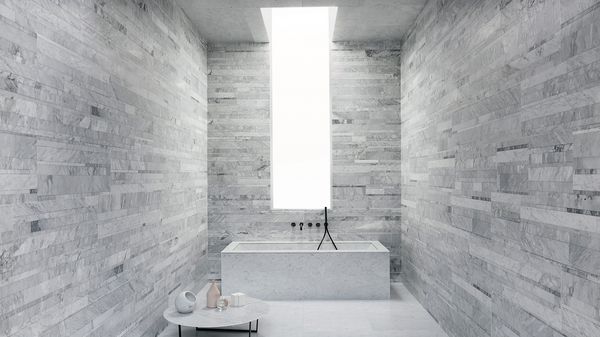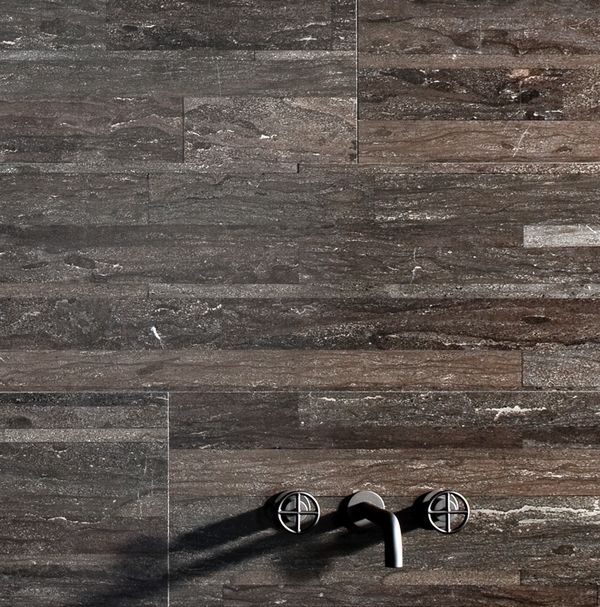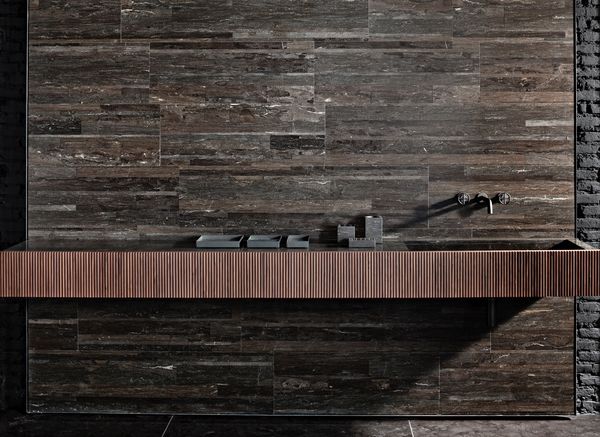
‘Green’ Marble
Salvatori is an award-winning Italian design company specialising in natural stone. We catch up with the CEO, Gabriele Salvatori, to discuss the future of natural tone and how he is shaking it up and making his family’s company more sustainable.
Words Billie Muraben
Photography Dario Tettamanzi

On the coast of Northern Tuscany, the head office of design company Salvatori sits with the grand backdrop of the Carrara marble quarries. Founded in 1946 by Guido Salvatori, the stone company was recognised as one of the most innovative of its kind in the 20th century. Now run by its third generation of Salvatori’s, Gabriele and Guido, the company is continuing its legacy of balancing tradition and innovation.


When Guido founded the company, it specialised in both wood and stone, and inventiveness was at its core — the now renowned spaccatello (split face) finish becoming a reality in 1950. But spaccatello was ahead of its time, and as the popularity of stone dropped from its initial boom after the Second World War, Guido and his partners decided to close that arm of the business.
Fortunately, as Gabriele described in our interview, his father saw an opportunity: ‘My father knew he would inherit both the good and the bad, and alone, with just my mother and a couple of workers, little by little they paid off the debts, grew and evolved the company.’ Research and development was at the core of his work, and Gabriele’s father, now 81, continues to visit the R&D department, where they are still working on ideas rooted in what he started. ‘The research, which arises from curiosity, keeps him very busy’, Gabriele tells me.

‘Although we’re in the stone industry, we’ve never actually been a typical stone company. My father was always looking at ways of reinterpreting stone’, Gabriele says. With the backdrop of Carrara, you may expect that they’d rely on its renowned marble, but Salvatori scouts for material from remote parts of the world, finding new quarries, and visiting locations before sunrise to test the quality of rock by sponging it down with water. ‘To know how a stone will respond you really need an alchemist’, Gabriele says.
The spaccatello finish, which involves breaking stone with a guillotine along naturally occurring cracks, is a core example of Salvatori’s atypical approach. As it grew in popularity from the 1960s, the spaccatello innovation allowed for the company to grow to around 80 employees working on 24-hour shift patterns to keep up with demand. Gabriele’s father also had to work out how best to install the stone, which was produced in only one size of brick, at 2cm x 7cm, and was akin to installing a mosaic: ‘At that time no method existed for mesh mounting such small pieces of stone. My father had the idea of using opened-out corn bags, to which pieces would be glued using a mild mix of water and leftover bread. We could transport and install our “mosaics” onto the facades of buildings in a single sheet, removing the bags by washing them down with water.’

For Gabriele — who joined the company at 14, working part-time at the factory through school and university, before taking the helm as CEO and expanding the company’s product line — the invention of Lithoverde® has been at the core of his work. Now recognised as the only natural stone to be comprised of 99% post-industrial recycled material, the research for what became Lithoverde® began in 2007 with the scraps and broken tiles piling up at Salvatori: ‘I lay them down in a stainless steel tray, layering up more and more pieces until there was an entire block — like a dry stone wall.’ The difference between a dry stone wall and what would become the new material, was that it needed to be bound, which required testing until they found a solution with natural resin that would create blocks of broken pieces. ‘It is truly environmentally conscious, not only have we stopped sending trucks to landfill, we’ve got to the point where our waste is not enough, and we’re collecting it from other companies.’ It’s this balance of innovation, with environmentally conscious solutions, that still binds Salvatori.

